Timeline: Northern Ireland political crisis over Provisional IRA
- Published
Stormont is currently embroiled in a political row over the status of the Provisional IRA.
BBC News NI looks back at how the fall-out began and how it has developed.

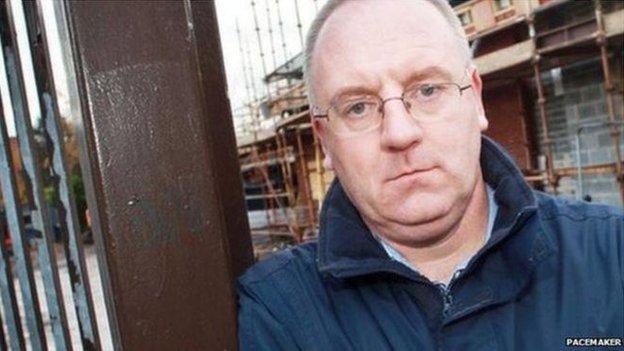
Gerard 'Jock' Davison was shot a number of times in the Markets area of Belfast, close to his home
5 May: Gerard 'Jock' Davison killed
Former senior IRA figure Gerard 'Jock' Davison is shot dead near Belfast city centre.
Police say they do not believe dissident republicans are behind the attack on the 47-year-old, and do not believe his murder was sectarian.
Mr Davison had been linked to the fight in a Belfast bar in January 2005 that led to the death of Robert McCartney, one of Northern Ireland's most high profile killings, but was never charged.

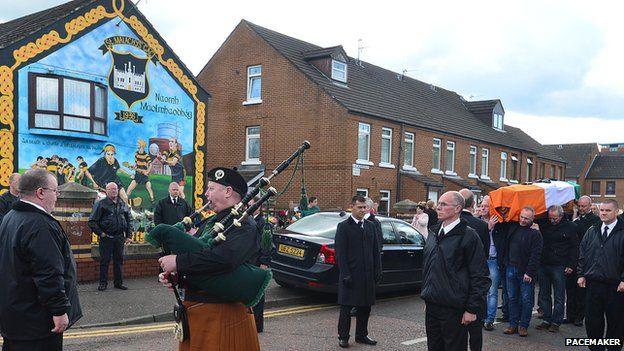
Mr Davison's funeral left his home in the Markets area before going on to Milltown cemetery
9 May: Gerard 'Jock' Davison's funeral
A lone piper leads the cortege carrying his coffin, which is draped with an Irish tricolour and a black beret and gloves, through the Markets area of Belfast before making its way to Milltown cemetery in the west of the city.

12 May: Murder probe 'challenging', police say
The detective leading the investigation into the murder Mr Davison describes the inquiry as "very challenging".

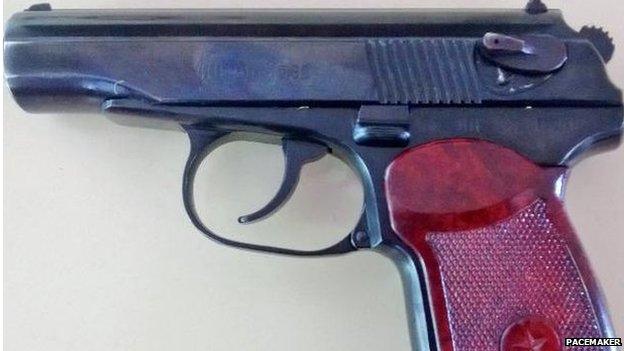
Police said the gun used in Mr Davison's killing was a Makarov from eastern Europe
26 May: Gun used in murder 'rare', police say
Police say a handgun used in the murder of Mr Davison man in Belfast is "extremely rare" and came from eastern Europe.
A senior police officer tells the BBC Crimewatch programme the gun and bullets are unusual.

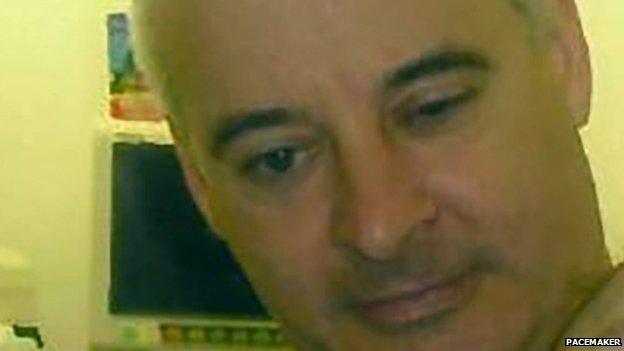
Police said Kevin McGuigan Sr's had been questioned over the murder of Mr Davison in May
13 August: Kevin McGuigan Sr killed
Former member of the Provisional IRA Kevin McGuigan Sr is murdered in a gun attack in east Belfast.
Police say he was one of a number of suspects in the murder of Mr Davison.
Sinn Féin denies speculation that the Provisional IRA may have been involved in his murder.
The DUP says there will be "repercussions" if that is the case.

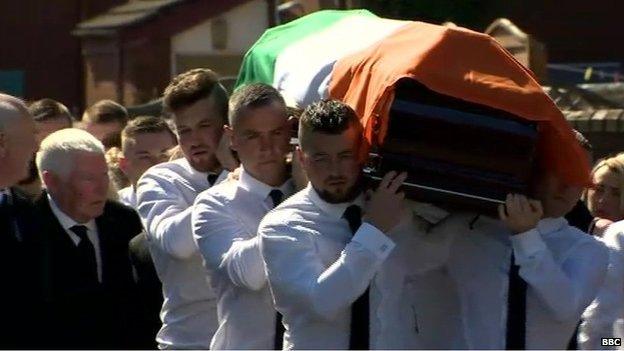
Hundreds of people attended Mr McGuigan Sr's funeral at St Matthew's Church in Belfast
18 August: Kevin McGuigan Sr's funeral
Mourners are told that violence and revenge do not solve problems.
Meanwhile, four men are arrested by detectives investigating Mr McGuigan's murder.

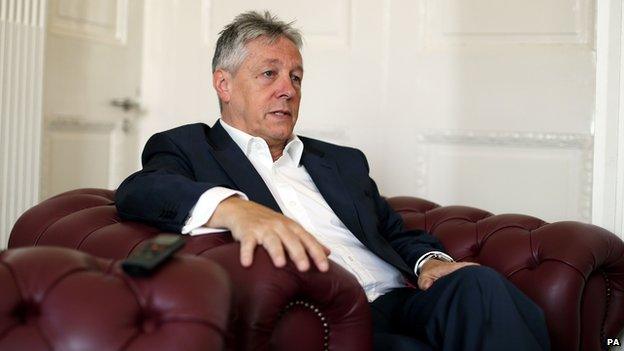
Peter Robinson said he would discuss Sinn Féin's role in government with other Northern Ireland parties
20 August: Robinson warns over IRA murder role
First Minister Peter Robinson warns that Sinn Féin should be expelled from the Northern Ireland Executive if it is proven that the Provisional IRA is involved in Mr McGuigan's Sr's killing.
Meanwhile, Patrick John Fitzpatrick, from the Lagmore area of Belfast, who was arrested in connection with Mr McGuigan Sr's murder appears in court on a firearms charge.

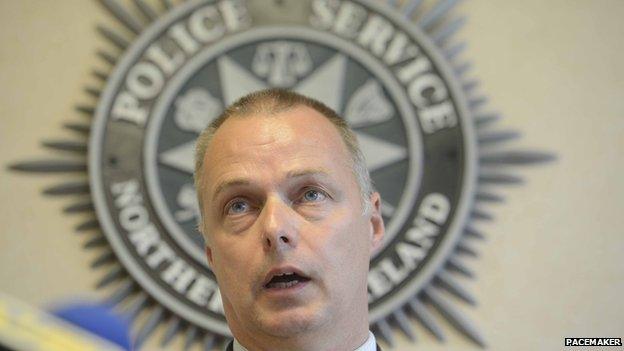
Det Supt Kevin Geddes said there was a belief that Provisional IRA members were involved in killing Mr McGuigan Sr
August 21: IRA members involved in McGuigan murder, police say
Police say they believe Provisional IRA members were involved in Mr McGuigan Sr's murder, alongside Action Against Drugs, a group consisting of former IRA members, dissident republicans and criminals.
But Sinn Féin president Gerry Adams rejects the allegations, and says the Provisional IRA left the stage in 2005.

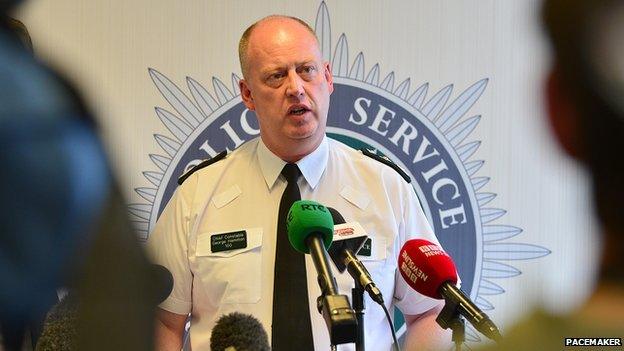
George Hamilton said there was no evidence the Provisional IRA sanctioned Kevin McGuigan Sr's killing
August 22: Provisional IRA still exists, police chief says
Chief Constable George Hamilton says the Provisional IRA still exists, but is not on a "war footing".
After meeting political parties to discuss the murder investigation, he says is is committed to "promoting peaceful, political republicanism".

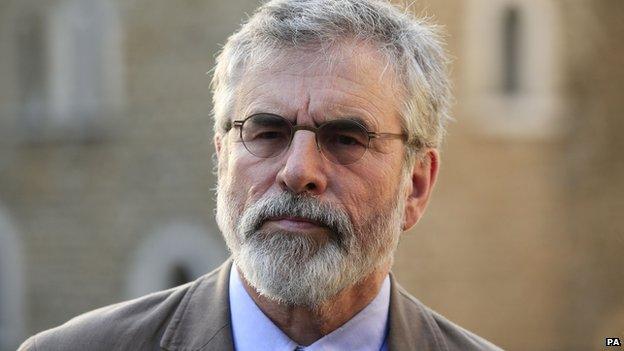
Gerry Adams said the IRA was undefeated when it called an end to its armed campaign in 2005
August 23: IRA has gone away, Adams says
Gerry Adams tells the National Hunger Strike commemoration in the Republic of Ireland that the IRA "has gone away".

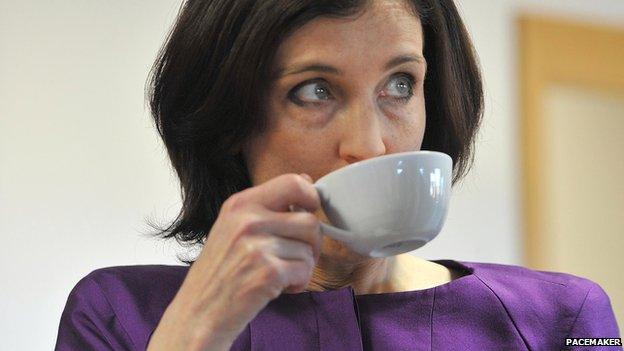
Theresa Villiers said she had been aware some structures of the Provisional IRA remained in place
August 24: No surprise over IRA existence, Villiers says
Northern Ireland Secretary of State Theresa Villiers says she is "not surprised" by the police assessment that the IRA still exists.
But she adds there is no evidence it is involved in terrorism.

August 25: Irish police to probe re-examine IRA
The Irish Justice Minister Frances Fitzgerald orders a fresh assessment of Provisional IRA activity.

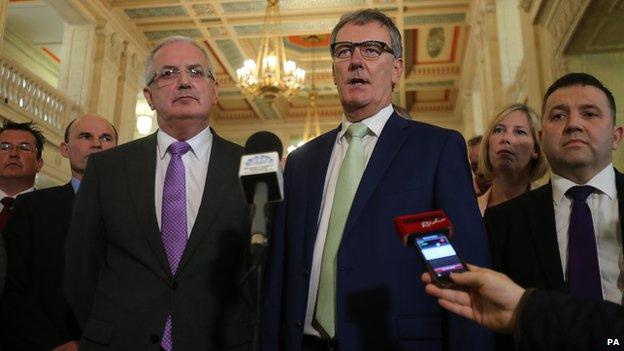
Mike Nesbitt said the party would move into opposition after their executive withdrawal
August 26: Ulster Unionists to quit executive
The Ulster Unionist Party announces its intention to withdraw from the Northern Ireland Executive.
Its leader Mike Nesbitt says the decision is based on the police assessment of the Provisional IRA's status and adds that Sinn Féin have "no credibility".
The party executive is to make a decision on the resignation three days later.

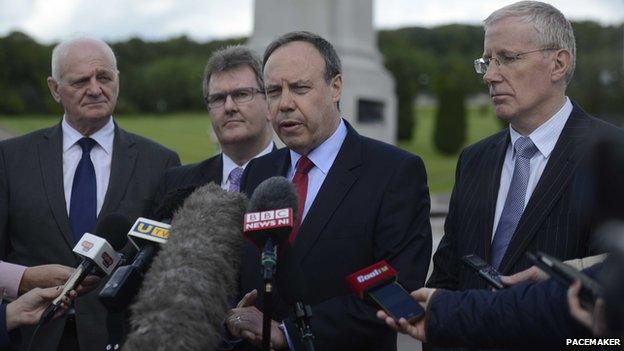
August 26: Stormont cannot continue as normal, DUP says
The Democratic Unionist Party says it will move to exclude Sinn Féin from the executive and could bring down the power-sharing government over the claims the Provisional IRA still exists.
Normal business at Stormont cannot continue until the row over the organisation's status is resolved, deputy leader Nigel Dodds says.

September 8: Villiers rules out suspension
Secretary of State Theresa Villiers tells MPs that despite a request from the DUP, the government does not think the time is right to suspend Northern Ireland's devolved institutions.
However, speaking in the Commons, the secretary of state said that if circumstances changed, the government would review its options.

September 9: Leading republicans arrested
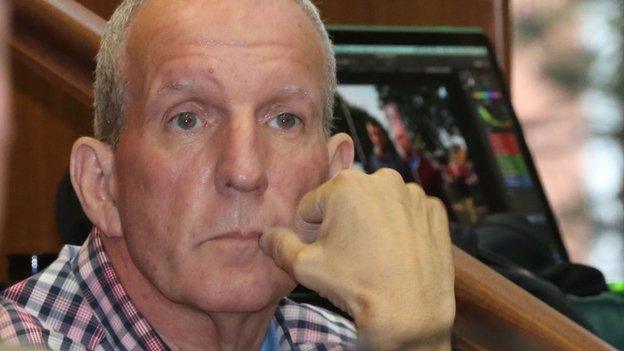
Three leading republicans, including Sinn Féin northern chairman Bobby Storey, are arrested over Kevin McGuigan's murder.

September 10: First Minister Peter Robinson steps aside
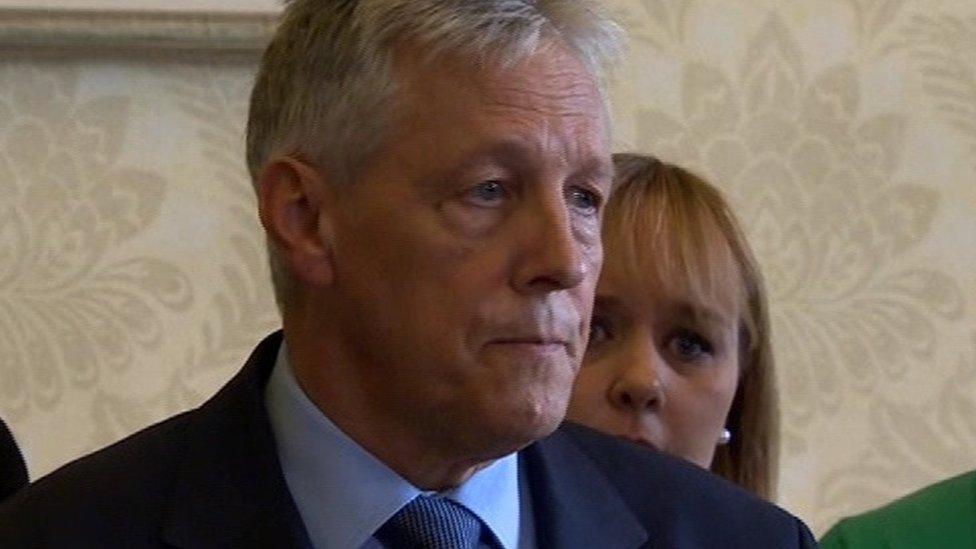
DUP leader Peter Robinson announces he will step aside as Northern Ireland first minister after the DUP failed to get enough support to adjourn the assembly.
Other DUP ministers also resign, although Arlene Foster remains as finance minister and takes over as acting first minister.
From then on, the other DUP ministers repeatedly resign and are reinstated for a few hours each week for the duration of talks aimed at resolving the political crisis.

September 10: Sinn Féin chairman released
Sinn Féin northern chairman Bobby Storey, who was arrested over the murder of former IRA man Kevin McGuigan, is released without charge.
Two other senior republicans arrested over the murder - Eddie Copeland and Brian Gillen - are also released.

September 18: Paramilitary assessment announced
Secretary of State Theresa Villiers announces the government has commissioned an independent assessment of paramilitary organisations in Northern Ireland.
The assessment, to be published in mid-October, will be used to inform parties at Northern Ireland's political talks.
DUP leader Peter Robinson said he was "content" with the announcement.

September 21: Talks to resolve crisis begin
Northern Ireland's main political parties begin talks in a bid to solve the ongoing crisis.
Secretary of State Theresa Villiers says the first day of talks were "focused and productive".
The talks concentrate on the issues of paramilitary activity and welfare reform.

September 22: Panel members announced
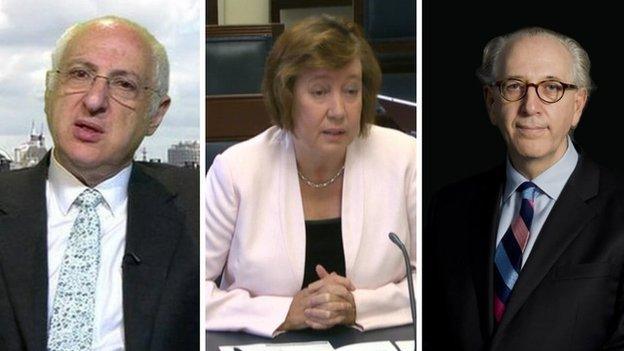
The names of the panel members who will oversee an independent assessment of paramilitary organisations in Northern Ireland are announced.
They are Lord Carlile of Berriew QC, Rosalie Flanagan and Stephen Shaw QC.
Secretary of State Theresa Villiers said they would bring "rigour, integrity and independence" to the job.

October 2: Cameron sets talks deadline
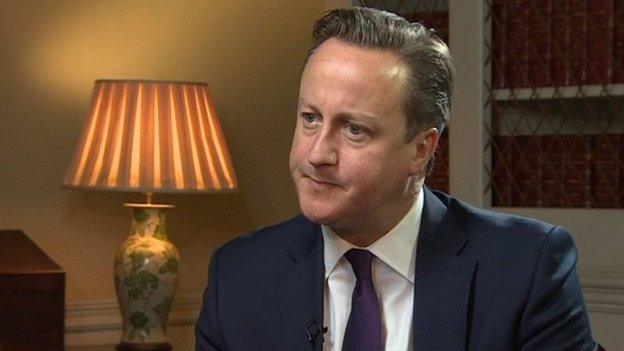
The prime minister tells the BBC that Northern Ireland inter-party talks have to lead to agreement by the end of October.
David Cameron said "under the rules of the institutions it gets increasingly difficult to have this process stalled and stuck".